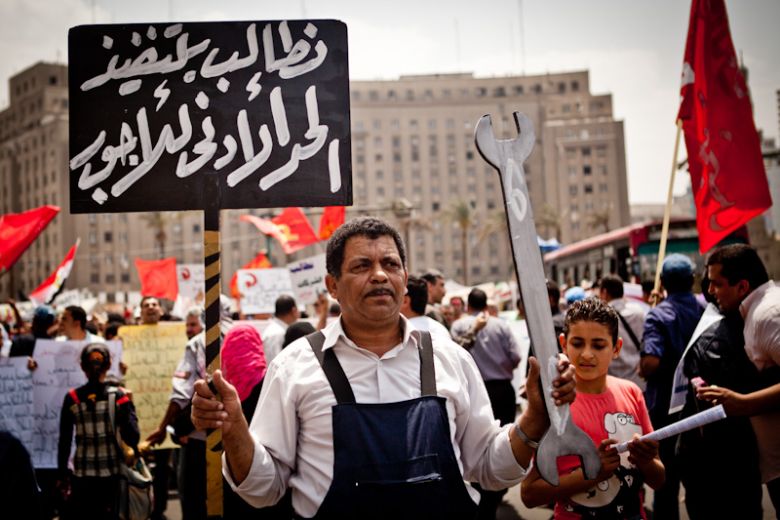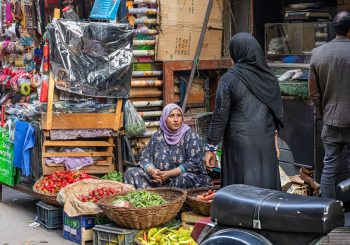Egypt’s workers played a major role in the surge of protests that swept across the country in the 2000s leading to the undermining and eventual fall of the regime of Hosni Mubarak in 2011. Despite subsequent regime crackdowns on domestic dissent, the independent labour movement continued its struggle to transform the Egyptian system.
Since October 21, as many as 17,000 workers at the Misr Spinning and Weaving Company in Mahalla, north of Cairo, have been on strike. They stopped production due to unfulfilled promises by president Abdel Fattah al-Sisi to provide a 10 percent salary increase in the form of a social bonus.
The bonus was to be retroactively granted to all public sector workers starting in July, according to a presidential decree issued by Sisi in September.
The Misr Spinning and Weaving Company is Egypt’s largest and oldest state-owned textile factory employing some 25,000 workers. First established in 1927 by Egyptian businessmen in collaboration with the Misr Bank, the factory has experienced sustained working-class militancy throughout its 88-year long history.
Kamal Fayoumi, a labour activist and independent union organizer said in reference to the current strike: “Other than the unpaid 10 percent bonuses, workers are calling for the operation of the Misr Spinning and Weaving Company in its full capacity, the reoperation of stalled production lines, the accountability of administrators for incurring losses, the reinstatement of punitively sacked workers and other demands,” reported Mada Masr.
Dalia Moussa, workers’ coordinator at the Egyptian Center of Economic and Social Rights (ECESR) added that the workers also are worried that the state-owned company is planned to be privatized.
The Egyptian Trade Union Federation (ETUF), a state-controlled body that up until 2011 was the only existing trade union federation in Egypt, has reportedly tried to convince local union committees to end the strike and encourage the workers to go back to work.
Furthermore, at the time of writing, there was no mention on the federation’s website of the strikes or president Sisi’s unfulfilled promise of the 10 percent bonus.
On Monday October 26, Labor Minister Gamal Sorour presented to the workers a 48-hour ultimatum to end the strike, warning that “legal measures will be taken against any attempt to obstruct work.” The workers ignored the warning and continued to strike.
The recent collective actions are indeed bold moves by the Egyptian labour movement, particularly in light of the ruling by the Supreme Administrative Court issued in late April that criminalized strikes and sit-ins at work places of state employees. The punishment for those defying the ban is forced early retirement.
In light of the current uptick in labour action it is instructive to look back on the history of Egyptian state-labour relations and the struggle for worker rights.
A History of Struggle
Though it’s generally understood that the origins of Egypt’s organized workers movement lies in a 1899 strike carried out by Cairo cigarette rollers, its full emergence came in the 1940s and 50s.
Since then, Egypt’s workers have struggled for their fundamental social, economic and human rights while having been equally met with harsh repression from the state apparatus.
After the establishment of the Egyptian republic in the aftermath of the 1952 military coup d’état staged by Gamal Abdel Nasser and his ‘Free Officers’, every subsequent regime has employed a combination of co-optation and repression to contain, undermine and suppress the labour movement.
With his populist, quasi-socialist veneer, Nasser sought to build a social base within the working class and the labour movement that could provide legitimacy and support for his stated project to transform Egyptian society into one based on more equitable social relations.
In that endeavor, he instituted a number of progressive labour reforms that increased workers’ job security and wages in addition to providing other social and economic benefits. At the same time however, he banned strikes, and from that point on, all forms of independent union activity would be strictly prohibited.
This occurred in a context where Nasser sought to establish a state capitalist economy, somewhat modeled on the Soviet example. Control of the economy meant that he could distribute the country’s accumulated wealth in a way that most effectively would benefit his regime. And thus, granting privileges to the working class while simultaneously imposing repressive measures on it had the net effect of increasing the regime’s control over this part of Egypt’s social structure.
A big part of Nasser’s ambition was to transform the Egyptian economy by increasing industrialization and boosting the productivity of the agricultural sector. Even though the first half of the 1960s witnessed the creation of one million new jobs and an annual GDP growth rate of 6 percent, Nasser failed to secure enough foreign exchange and investment capital. This made him impose severe austerity programs, which reduced workers’ wages while increasing their working hours.
Taken together, labour militancy under the rule of Nasser was successfully crushed by a regime that purported to represent ‘the masses’ while in actuality it was more closely associated with the interests of Egypt’s corporate sector.
What Bassam Haddad has described as “the nexus of political and economic power” in reference to the relationships between hegemonic elites in Syria, can also be noticed in the early years of Egypt’s republican era.
Nevertheless, returning to the Nasser regime’s relationship to the trade unions – instead of dismantling the union structures, Nasser established a corporatist arrangement whereby unions were reorganized into ‘singular, non-competitive, hierarchical organizations’ under the control of the state while ‘at the regional level, a single labour confederation [ETUF, established in 1957 ] was to enjoy a monopoly of representation for the union movement as a whole,’ as Robert Bianchi succinctly put it in his Unruly Corporatism: Associational Life in Twentieth-Century Egypt.
This arrangement was largely preserved by successive Egyptian regimes and would not be fundamentally changed until the 2011 revolution.
Workers in the Neo-Liberal Era
With the death of ‘the leader of the Arab world’ – as Nasser often was described – in 1970, a new era of Egyptian state-labour relations was ushered in.
Anwar al-Sadat (1970-81) and Hosni Mubarak (1981-2011) restructured the economy by way of policies of liberalization.
The two leaders also shifted Egypt’s political orientation from a non-aligned, but nonetheless Soviet-leaning position, to a full-fledged alliance with the United States and the West.
Sadat’s infitah, or “Open Door” policy, shrunk the public sector and increased foreign direct investment resulting from the neo-liberal policies of the “Washington Consensus” advocated by the U.S., the International Monetary Fund (IMF) and the World Bank.
As Joel Beinin explains, “Washington Consensus policies undermine fundamental worker rights by seeking to create a ‘flexible labor market’, making it easier to fire workers, weakening unions, and reducing public expenditures on health care, education, pensions, unemployment benefits, infrastructure, salaries of government workers, and labor regulation agencies.”
What these policies did was furthermore “to integrate Egypt into the Western capitalist system”.
Egypt’s political and economic reorientation did however not pass by without resistance. Throughout the mid-1970s, strikes and popular protests spread across the country.
Perhaps the most prominent of them was the 1976 transport worker strike as well as the bread riots of 1977. These occurrences were a direct outcome of the neo-liberal shift that Egypt had embarked upon in the years prior.
Continuing to the 1980s and 90s, Mubarak deepened and expanded the liberalization policies instituted by Sadat. In 1991, a major neo-liberal reform package was implemented with the signing of an Economic Restructuring and Adjustment Program with the IMF.
It demanded “liberalization of trade and prices, privatization, and labour flexibility, as well as the removal of several social safety net measures.”
Indicative of the deteriorating situation of the Egyptian working class was the sharp increase in labour protests in the 1990s. In fact, labour actions doubled as compared with the previous decade.
Despite the fact that the Egyptian Trade Union Federation (ETUF) was created and structured in such a way as to control workers, it nonetheless was unable to contain labour militancy in the Mubarak era.
Between 1998 and 2010, 3,400 to 4,000 strikes and other collective actions occurred with the participation of up to 4 million Egyptian workers. The driving factor behind these actions was a deep-seated animosity towards the ever-accelerating privatization process that had been set in motion in the 1970s under Sadat.
Two major instances of collective working class action during this period were the crippling strikes in 2006 and 2008 staged by workers in Mahalla – the same location as the currently ongoing center of strike action. These strikes are highlighted by many as two of the foremost factors that sparked the protest movement which ultimately led to the 2011 revolution.
Although ETUF lacked any form of legitimacy as to promoting workers’ interests, it nevertheless “remained the dominant nominal representative of organized labor” on the eve of the January 2011 revolution.
Since then, a number of fully independent trade union structures have emerged, the first of which was the Egyptian Federation of Independent Trade Unions (EFITU). The federation was announced on January 30 2011, in the midst of the growing momentum of the January revolution. In subsequent time, it would become the largest assemblage of independent Egyptian trade unions.
The Mahalla Strike and Prospects for Egypt’s Labour Movement
The ongoing strike in Mahalla points to the fact that Egyptian workers are not satisfied with the regime of Abdel Fattah al-Sisi’s policies on social and economic issues.
The president’s promises of economic prosperity and social justice by way of ‘mega projects’ in the form of an expanded Suez Canal or the planned new capital city appear mainly to be a way for him to delay any substantial reforms. Reforms that would actually change the conditions for the Egyptian working class.
Sisi’s attempts to suppress the labour movement through strike bans and the anti-protest law just goes to show that the regime perceives an independent organized working class as a force to be reckoned with.
If one may speculate, it is not unlikely that if the current regime holds on to Egypt’s long legacy of neo-liberal policies, we will witness further and escalating labour action in the foreseeable future.
Without addressing the demands and deep-rooted concerns of the Egyptian working class, the Sisi regime will likely lose what little it has left of its populist façade. The ongoing parliamentary elections, the first round of which saw a voter turnout of around 26 percent, is a testament of the president’s waning popularity and the increasing disillusionment with the political system.
If things continue on this path, it’s not unimaginable that the regime will have to face another popular uprising that once again will attempt to uproot the deep structures of Egyptian authoritarianism.
Nonetheless, in the final analysis, the strike in Mahalla demonstrates that Egyptian workers are not willing to bow down in the face of hardening state repression. While they are facing difficult challenges, there is no doubt that the labour movement continues their long struggle for bread, freedom, and social justice.







Comments (16)
[…] Why Do Egypt’s Rulers Fear the Working Class? – Despite subsequent regime crackdowns on domestic dissent, the independent labour movement continued its struggle to transform the Egyptian system. Since October 21 … jobs and an annual GDP growth rate of 6 … […]
[…] The Mahallah textile company is known for its political significance as it has a long history of labour struggles. […]